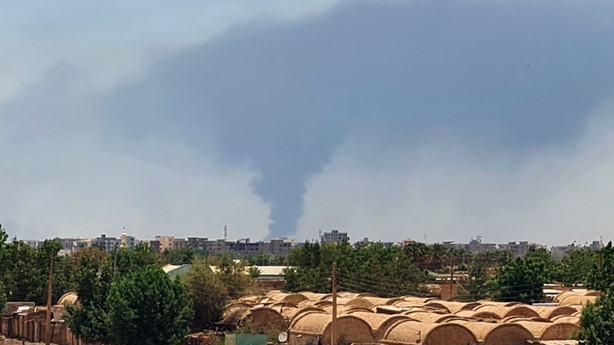Some 200,000 people have fled from Sudan to neighbouring countries since violence erupted last month, the United Nations refugee agency has said, including many malnourished children arriving in Chad.
Some 60,000 have arrived through the desert to Chad, including about 30,000 in the past few days, United Nations High Commissioner for Refugees (UNHCR) spokesperson Olga Sarrado told a press briefing.
Nearly 90% of the new arrivals are women and children, she said, and one fifth of the young children are malnourished.
"UNHCR calls for immediate financial support for all actors involved in the response to avoid a humanitarian catastrophe, prevent tensions over strained resources and support those forcibly in a dignified manner," she said.
"Support from the private sector has been slow compared to other emergencies, despite the urgency and severity of the crisis," she added, saying a new appeal was expected after the agency called for more than €400 million last week.
At the same briefing, a spokesperson for the UN children's agency said that a factory in Sudan's capital, Khartoum, producing food for malnourished children had burned down.
"This is the darkest, most distinct illustration to date of how this conflict threatens the lives of children through multiple means," said UNICEF spokeperson James Elder.
He did not know whether the factory, which produces 60% of the ready-made food cartons in Sudan, was deliberately torched.
Earlier, Sudan's warring military factions signed a commitment to respect humanitarian principles in their ongoing conflict, but they did not reach a ceasefire during talks described by US diplomats as difficult.
Nearly one month after the eruption of violence that has killed more than 750 people, injured 5,000 and displaced more than 900,000 others, the two sides promised in talks in Saudi Arabia to protect civilians, but nothing looked set to change immediately.
"We agree that the interests and well-being of the Sudanese people are our top priority and affirm our commitment to ensure that civilians are protected at all times," said envoys from army chief Abdel Fattah al-Burhan and paramilitary commander Mohamed Hamdan Daglo.
"This includes allowing safe passage for civilians to leave areas of active hostilities on a voluntary basis, in the direction they choose," the declaration said.
The agreement commits both sides in general terms to let in badly needed humanitarian assistance after looting and attacks targeting aid in the impoverished country, Africa's third largest in area.
The declaration calls for the restoration of electricity, water and other basic services, the withdrawal of security forces from hospitals and "respectful burial" of the dead.
The United States and Saudi Arabia, which are together leading the diplomatic drive, said that talks were ongoing with a proposal on the table for a ten-day truce, which would lead to negotiations on a longer-term end to fighting.

However, fighting and looting raged most of yesterday in the capital Khartoum and US diplomats were frank about the obstacles in the nearly week-long talks in Jeddah.
"This is not a ceasefire. This is an affirmation of their obligations under international humanitarian law," said a US official involved in the talks, who called the two sides "quite far apart".
"We are hopeful, cautiously, that their willingness to sign this document will create some momentum that will force them to create the space" to bring in relief supplies, she said.
At least 18 humanitarian workers have been killed since the war started on 15 April, with many non-governmental organisations and United Nations agencies at least temporarily suspending work.
The UN's World Food Programme said millions of dollars worth of food was looted in Khartoum.
The conflict erupted when the paramilitary Rapid Support Forces, set up by former dictator Omar al-Bashir for a scorched-earth campaign in Darfur, refused to be integrated into Sudan's army under a planned transition to civilian rule.
The Forces of Freedom and Change, the pro-democracy force sidelined in a 2021 putsch by the two generals now at war, saluted the Jeddah declaration as "a first step in the right direction."
The UN-led support mission for Sudan, which also includes the African Union and regional IGAD bloc, also welcomed the declaration and called on the warring factions to "convey clear and unequivocal instructions to lower ranks" to allow humanitarian access.

